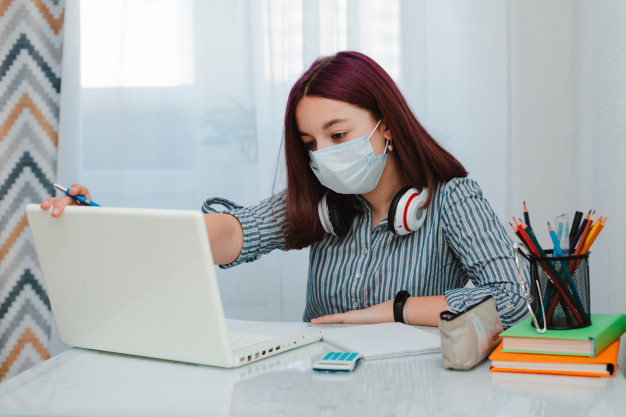
Education in the Time of COVID-19
We are living in unprecedented times, locked inside the four walls of our home, changing our habits to unimaginable proportions yet continuing to wait for all of this to end. Covid-19 pandemic has literally brought the world to a standstill. A few months into the pandemic, we are witnessing a staggering re-opening of economies. As scientists and epidemiologists are telling us, we have to be patient before we can relax and get back to our life. We will have to adapt to the ‘new normal’ where everything works, but differently.
How has COVID-19 Affected Our Daily Lives?
We are already seeing how the new normal will look like. We are going to work, but from home. We are going to learn, but from home. We are going to socialize, but from home. We are doing everything we did before, but from home. Is it inconvenient? Of course it is! We are adapting to change we didn’t think we could. Who knew eating home cooked food would be so much fun. Video-calling old friends and remembering old times is quite re-invigorating, isn’t it? Though we are all staying home and only venturing out when absolutely necessary, we have learnt to make the best of this situation.
We have learnt to do household chores as a family. Since the outbreak of the pandemic, we have learnt to re-energize ourselves by learning new things. If some are excelling their culinary skills, others are advancing their career by participating in webinars and online courses. However, the pandemic has been the toughest for the student community. Suddenly, they had to give up their daily routine. They didn’t need to go to their educational institutions, they need to sit in classes and they need to write their exams.
Impact of Covid-19 among Students?
As the world comes to an uncertain standstill, students everywhere had to come to terms with the new definition of normalcy. The sudden shift from classroom teaching to online classes hasn’t been easy – neither for the students nor the educators. There was scarcely any time to plan this transition. The students were suddenly told to stop going to their institutions and to continue their education from home. While educational institutions closed because of the Covid-19 pandemic, it remains crucial that the students complete their curriculum, sit for their tests and regular evaluations continue without any glitch.
In the past few things, the education sector has learnt a lot. Acclimatizing to change, learning the ropes of digital education, distant learning have all become a part of life today. It hasn’t been easy for anyone. There have been many hurdles the system had to cross in order to come to this stage of online education.
Challenges Education Sector Had to Overcome
- Everyone was unprepared – Students have always seen laptops and computers as a source of entertainment. Many have used them solely for gaming. Internet was the means to escape to a fantasy land, to watch shows, movies, to read what they liked and to relax. For them to accept that they had to use these gadgets for classroom education was not an easy pill to swallow. They asked many questions. How would we learn without someone teaching us? How could teachers highlight the importance of a subject distantly? Could we do assignments with minimal help from our educators?
The pandemic brought newer challenges for teachers as well. The shift from classroom teaching to online learning sessions wasn’t easy for them. Many had to learn the ropes of digital education overnight, with minimal help. Those who were proficient in online education still grappled with the magnitude of it all.
- Passive Learning – The biggest challenge for students across the world was to adjust to online learning itself. In developing countries like India, students are accustomed to learn from the teacher in-person. Classroom teaching has been the cornerstone of education till now. Digital learning was seen as an added skill one must learn. It wasn’t compulsory. Online learning induced by the Covid-19 pandemic had resulted in students losing interest in their curriculum. Their attention span reduced to bare minimum. Most couldn’t see the importance of online education and why they had to continue learning. It was equally distressing for teachers to keep up the momentum. They had to make use of visual aids, presentations and creative lesson plans with bare minimal tools. Passive learners who took time to grasp the new system lagged behind. They needed extra care but didn’t know whom to ask.
- Little Practical Demonstration – There are certain subjects that invariably need to be demonstrated practically for the students to comprehend. We will take the example of fashion designing courses to fully understand this problem. You cannot expect a fashion designing student to learn the various techniques involved in fabric making, designing, stitching patterns and the trending styles through online classes. It is more strenuous for the educators to make lesson plans that will adequately pass the accurate information to their students due to the lack of practical illustration in a classroom.
- Difficulty in Student Recruitment and Admission – The coronavirus pandemic has ensured a series of events in the education sector that have never been dealt with before. The admission procedures in schools and colleges that require physical interaction with the students have to be re-modified completely. We still don’t know when normal classes can resume again. Students are unable to seek admission in their favored institutions due to the pandemic. This has increased stress levels and anxiety among students.
How The Education Sector Rose Above All Odds
It is only natural for humans to rise above all challenges, defeat the odds and emerge victorious. Though the pandemic is still far from over, we have learnt to live with the virus. Educational institutions have brought policy changes that has made online learning much easier. Governments are reducing syllabus to ease students’ workload. All in all, there has been many positive things the pandemic has taught the education sector. Let’s take a look.
- Integrated Learning Experience – As a result of being forced into the digital platform, most educational institutions are coming up with integrated learning and teaching system. In simpler terms, educators will henceforth be accustomed to deliver both face-to-face classes and will be adept to teach through online mediums. This blended learning experience will eventually become mandatory for educational institutions all around the world. Instead of submitting handwritten assignments, students have learnt to do their work on online platforms. Once properly adopted, the digital platform is poised to improve the education sector.
- Implementation of Modern Management Systems – The scope of online learning has expanded to the industrial sector too, giving rise to new job opportunities. Digital learning and tutoring apps have gained immense popularity due to the pandemic and subsequent lockdowns. It has also widened the opportunity for educational institutions to imbibe modern management systems to upgrade the learning experience for students, teachers and also the administrative staff.
- Informative Learning Experience – Since all classes are being conducted virtually, it has broken the boundaries of confined learning. Teachers are at the liberty to divulge relevant information to help students understand complex topics and also to catch up with the latest occurrences around the world. The quality of content in classes has improved significantly because of the global pandemic. There is less scope for irrelevant information and that has help diminish the attention span of students.
- Growth in Participation – We all know that there is no limit to knowledge. The pandemic has proven this to be absolutely correct. Educators from around the world have now started participating in teaching students other than their own class. Everyone is looking out for collaborative teaching that has expanded their knowledge and helped others in the process. Virtual conference calls have piqued the interest of learning in students everywhere. The seminars that students were unable to attend earlier have become accessible through webinars which are open to one and all.
Tips For Students To Deal With The Covid-19 Epidemic
Here are some tips that will help students to develop healthy study habits and guide them in the correct path of dealing with these sudden changes.
- While attending online classes, students should dress formally, even if it means wearing their uniforms. This will immediately transform how to mentally prepare yourself for the classes. You will respond better to lessons. Staying in your pajamas for online classes reduces your attention level drastically and you are more prone to be have less retention of what is being taught.
- If you have a dedicated workstation which you can use regularly for your online classes, it increases your focus levels. If you don’t have one, create a space right away. This will help you stay focused.
- It is essential that you establish a proper routine for each day. It should include all the things you did earlier when you could go out. Replicating these actions sets the right mood in your mind and it makes you prepared for a day filled with online classes.
- Being at home, there are many distractions which you never faced while in class. It can be your pet dog wagging her tail in front of you or your younger sibling asking for help. You need to set strict boundaries which you will not overstep while attending online classes.
- No matter which digital platform you have to use for your virtual classes, be it laptop, tablet or smartphone, there is always a scope for distraction. You might get the urge to check your social media accounts or play a round of your favorite game. Some ads might pop up that instantly disrupt your focus. You can use ad-blockers to resolve that issue.
- You must take small breaks in between, just like you did after each class got over. It is important to regulate your physical movement, take those water breaks and more importantly to relax. You should not let the pressure of finishing your curriculum online get to you and increase your stress levels.
- One essential tip for coping with online classes is to ask frequent questions. This allows you to pay attention throughout the course of the virtual session. Besides, it provides a sense of contentment to the teacher as they realize you have been focused and not just sitting idle in front of the screen.
- You must realize that it is absolutely normal to feel stressed out and anxious. What you can do to cope with it is to take a hold of things gradually, and not all at once. You should talk with your educator and fellow mates about how they are dealing with the situation.
It would be wrong to say that the transition has been smooth. It hasn’t. It has been a challenge for everyone. But humans are known to rise for the occasion, meet any challenge head-on and emerge victorious. The student community surely is garnering applauses from everywhere because they have adapted to the change. Educators have continued to be role-models, like always. Everyone is still learning to make things better. Many things have improved in the last few months but the road ahead is long. Students, teachers, facilitators as well as administrators have to work together to make learning fun, interactive and informative.
It is especially important for institutions offering specialized courses to make online learning fun. Many institutions offering courses such as fashion designing already had implemented digital education, much before the pandemic. Today they are simply using the resources better. Students enrolled in such courses from path-breaking institutions are benefiting from the improved teaching methodologies. Those seeking admissions are filling out online forms of such courses knowing how much they will benefit even though they will have to learn from home. It has become even more important today than it ever was to choose the right institution for learning. Students must look for institutions where teachers have turned facilitators, where intuition and creativity is given wings to fly and where learning is not confined to the four walls of a classroom.



